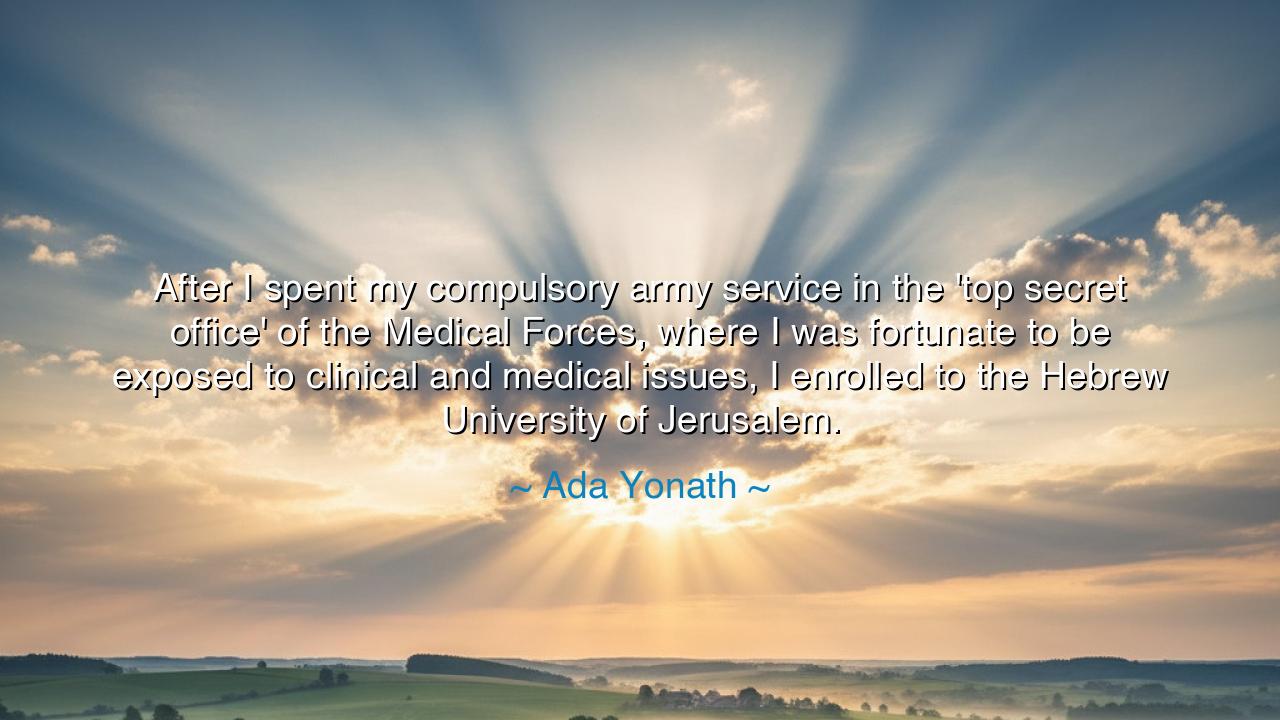
After I spent my compulsory army service in the 'top secret
After I spent my compulsory army service in the 'top secret office' of the Medical Forces, where I was fortunate to be exposed to clinical and medical issues, I enrolled to the Hebrew University of Jerusalem.






In the words of Ada Yonath, "After I spent my compulsory army service in the 'top secret office' of the Medical Forces, where I was fortunate to be exposed to clinical and medical issues, I enrolled to the Hebrew University of Jerusalem." This quote speaks to the power of unexpected experiences in shaping a life’s purpose. Yonath’s journey reveals a profound truth about how one’s exposure to challenges, especially those that are intense and secretive, can be the catalyst for personal and professional growth. Through her army service, she was not just following an obligation, but gaining invaluable insights into the world of medicine, which later set the foundation for her academic pursuits.
The ancients understood that the most powerful learning often arises from unplanned experiences. Socrates famously taught that wisdom comes from experience and reflection, not from books alone. He encouraged his followers to seek knowledge through dialogue and practice, rather than relying solely on theoretical study. Ada Yonath’s experience, working in the top-secret office of the Medical Forces, mirrors this idea—she did not go into the army seeking knowledge of medicine, yet it was there that she encountered a world that profoundly shaped her future. This is a timeless lesson that knowledge is often found where we least expect it, through circumstance, not just choice.
Consider the story of Alexander the Great, whose education was shaped not only by his teachers, such as Aristotle, but by his travels and military campaigns. As he ventured across the known world, Alexander encountered not just military battles but complex cultural exchanges, scientific innovations, and medical practices from various civilizations. His exposure to different knowledge systems during his conquests fundamentally shaped his understanding of the world. In the same way, Yonath’s exposure to clinical and medical issues in her army service opened her eyes to a new world of science, providing the insight she needed to later pursue higher education in the field of medicine. For both Alexander and Yonath, learning was not confined to traditional classrooms, but expanded through life experiences that revealed new possibilities.
In the ancient world, the pursuit of knowledge was not merely academic, but deeply intertwined with the physical and practical world. Hippocrates, the father of medicine, believed that true learning in medicine came from observing and treating real patients, rather than merely reading medical texts. Hippocrates himself was both a theorist and a practitioner, understanding that the application of knowledge in real-world scenarios was as important as any textbook theory. Yonath’s work in the Medical Forces aligns with this ancient ideal. Her exposure to the realities of clinical practice during her service was the spark that ignited her passion for the medical sciences. Like Hippocrates, she did not merely study medicine from afar; she experienced it firsthand and learned through immersion in the practical world.
Yonath’s path also embodies the spirit of perseverance. After her army service, she did not rest on the foundation she had gained but pursued further education at the Hebrew University of Jerusalem. Her decision to enroll in the university reflects a commitment to growth—a determination to build on her foundational experiences and continue her academic journey. The ancients often spoke of the importance of lifelong learning. Aristotle taught that the pursuit of knowledge is a never-ending endeavor, one that requires both dedication and an open mind. Yonath’s decision to seek formal education after her practical experience in the army is a modern reflection of this ancient wisdom. It demonstrates that education is not a destination, but a continuous, evolving process.
The lesson from Yonath’s words is one of openness to the unexpected and dedication to continual learning. Life experiences—especially those that seem far from our original intentions—often provide us with the greatest opportunities for growth. Just as Socrates and Hippocrates found wisdom not just in theory but in practice, so too can we learn from the unexpected events in our lives. We must remain receptive to the lessons that come through experience, adapting to the changes they bring, and always striving to expand our knowledge.
In our own lives, we can take Yonath’s example to heart by seeking opportunities for learning in all circumstances—whether in the workplace, through volunteer experiences, or even in the everyday challenges we face. We must not dismiss unexpected experiences as unimportant, but embrace them as moments that can shape our future and inform our understanding of the world. Like Yonath, we should see every step in our journey as a building block, drawing knowledge from both formal education and practical experience. In doing so, we will continue to grow, adapt, and enrich our understanding of the world around us.






AAdministratorAdministrator
Welcome, honored guests. Please leave a comment, we will respond soon